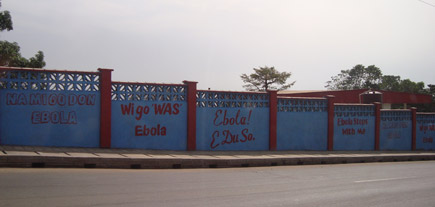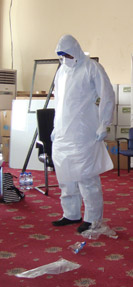Ebola outbreak holds lessons for world health community
U.S. physicians who traveled to Africa to combat Ebola there brought home lessons for the world health community.
The massive Ebola outbreak in West Africa may have faded from headlines in the U.S., but new cases continue to pop up, albeit it in smaller numbers, and the scars left are deep. Many clinicians there died and others quit out of fear, leaving medical facilities desperately short of staffing.
Physicians from the United States who traveled to West Africa to offer their help and expertise in recent months talked to ACP Internist about what they saw and the larger lessons for the world health care community.

Sugat K. Patel, MD, FACP, an infectious disease physician with Samaritan Health Services in Corvallis, Ore., and Eileen D. Barrett, MD, MPH, FACP, a general internist and hospitalist in Albuquerque, N.M., each spent about 6 weeks on overlapping trips to Sierra Leone earlier this year.
They divided their time between working in an Ebola treatment unit and helping care for patients at a government hospital, managing a general patient population, including those with malaria, tuberculosis, and HIV and Ebola survivors with ongoing complications. They also helped monitor a unit of patients with suspected Ebola.
All patients evaluated at outpatient clinics or hospitals must be screened for Ebola, and in many it needs to be ruled out before they can receive care for non-Ebola illnesses, Dr. Patel said.
“The case definition for Ebola is so sensitive that many people are sent to the holding centers or Ebola treatment units. For example, people who come in with fevers, nausea, vomiting, and loss of appetite are sent to a special unit to be ruled out for Ebola before they can receive definite treatment for appendicitis or pregnancy complication,” Dr. Patel explained.
Approaching Ebola
Dr. Barrett said she was interested to see that the work environment in Sierra Leone's Ebola care units was structured differently than is typically seen in the U.S.
“Doctors and nurses do the same work. It is very team-oriented because the risk to the health care workers is so high that you have to do everything with a buddy,” she said.

Also, the work is very physically demanding due to the protective gear clinicians have to wear, including a full body suit with apron, gloves, masks, boots, and face shields. It was very hot in the units, and there is no air conditioning. Also, the protective equipment is only effective for 1 hour or 4 hours, depending on what fabric it is made of, Dr. Barrett said.
“You need a lot of people to cover the day because of the physical exertion of the work,” she said, comparing the experience to wrapping yourself in plastic wrap in 95 °F with high humidity. “You sweat so much that you physically can't work very long.”
Anything that goes wrong, such as a physician passing out from the heat, can cause a deadly chain reaction, so strict protocols are followed. Workers have to drink rehydration fluids before putting on the gear and stay in close communication at all times.
“It is such a different mindset there. In the U.S., toughness is rewarded. Working without sleeping or eating is seen as making you a good worker, but there, working too long endangers lives,” Dr. Barrett said.
Is it really over?
Although West Africa has low rates of new Ebola cases now, physicians who have worked there said they worry the virus will return at some point because of the weakened health care infrastructures.
“As long as there's a single case anywhere, it has the potential to metastasize quickly,” Dr. Patel said.
Benjamin J. Park, MD, a 13-year veteran of the Centers for Disease Control and Prevention, traveled to West Africa several times during the Ebola outbreak to help establish better infection control measures. He recently returned from Sierra Leone and saw that cases are still occurring and some health care workers are still getting sick. “We have made great strides, which is testament to the hard work that has been going on, but there is still work to be done,” he said.
None of the 3 physicians believe there is a high probability Ebola will become a problem in the U.S., where personal protective equipment is widely accessible. Also, the U.S. has created an extensive screening process for people entering from West Africa.
Dr. Barrett experienced this screening when she returned home via Newark, N.J. Local health officials had been notified that she was coming, and they took her temperature on arrival and asked her many questions. She was given a diary in which to record any symptoms and also was given a cell phone preprogrammed with a number to call with problems or questions. She also had to check in with her local health officials twice a day and had a few limitations on her activities for 21 days.
Applying lessons learned
Dr. Patel said his experiences in Sierra Leone gave him a new appreciation for the importance of meticulous infection control. In the U.S., these principles can be applied to problems such as Clostridium difficile or methicillin-resistant Staphylococcus aureus, he said.
“I have been in practice in infectious disease for more than 10 years and yet when I participated in a WHO [World Health Organization]-sponsored training session on Ebola care, I had an hour-long lecture with a practicum on hand washing,” he said. “It was the first time I've ever had a proper hand-washing lecture, and I learned I was doing it wrong. I wasn't as meticulous about my hand washing as you need to be with Ebola.”
While he acknowledged that the 1-minute hand washing advocated in Sierra Leone is not needed when treating a typical patient in the U.S., he said he saw how inadequate the 5-second wash employed by many U.S. doctors is.
Dr. Park went to Nigeria at the beginning of the Ebola outbreak to work in Lagos, where there was a huge potential for Ebola to spread because of the population density in what is now the largest city in Africa.
He and his colleagues found that lessons that are taken for granted in the United States in terms of infection control did not exist in the 3 countries that were affected: Liberia, Sierra Leone, and Nigeria.
“U.S. doctors often say disease has no borders, and this outbreak has proven that problems such as Ebola belong to everyone,” he said. “It's important to fight emerging diseases overseas because that's really the only way to contain them and prevent them from coming here.”
Dr. Patel also said the outbreak showed the importance of remaining alert to Ebola everywhere. For example, his hospital is still querying patients about risk factors, such as recent travel to West Africa or having a fever.
“As long as you have Ebola patients in a region of the world and there is international travel, there is a potential for cases to crop up elsewhere,” he said. “We need to maintain a level of vigilance.”
Dr. Barrett said the world needs to help affected countries improve their health care infrastructure so that if such an outbreak happens again, it doesn't get so out of control.
Dr. Patel agreed, saying that the key lesson to be learned is that Ebola led to so many deaths not because it appeared in a new location but because it showed up in a location where the health care infrastructure was “dismal.”
“As U.S. physicians, our obligation to provide health care to our community and to our state and to our country doesn't end at the borders. We have to consider what we can do to ensure people in other parts of the world have access to health care,” he said. “If we believe their struggles won't affect us, Ebola proved us wrong.”





